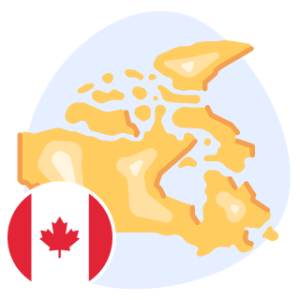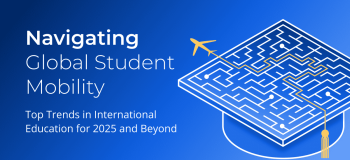On January 22, 2024, the Canadian government on Canadian study permits. This study permit cap means the number of approved study permits (also sometimes referred to as Canada student visas) in 2024 will be limited to around 360,000, to be allocated by province.
Master’s, PhD, and K-12 students, current study permit holders, and those looking to extend their studies are fully exempt from this cap, meaning this will primarily affect those seeking an undergraduate or college education in Canada.
The news from Immigration, Refugees and Citizenship Canada (IRCC) is a significant shift in policy from the previous decade, and is meant to help stabilize regional population growth, helping to ensure the success and well-being of all current and future international students in Canada.
Keep reading for more details on this Canada student visa news, and what these changes mean for students, recruitment professionals, and academic institutions.
Quick Summary
- This temporary two-year cap will reduce accepted study permits by 35% in 2024.
- Master’s, PhD, K-12 students, and current study permit holders will not be affected.
- Study permits will be allocated based on each province’s population.��
- Update: Starting May 15, students who begin their studies at public-private partnership institutions will no longer be able to access post-graduation work permits after graduating.��

Canada Student Visas Now Require an Attestation Letter
For prospective international students, this Canada student visa news may be the most immediately important. As of January 22, 2024, affected students must as part of their study permit application. Applications missing an attestation letter will be returned to the applicant.
Students heading to Quebec may use their Certificat d’Acceptation du Québec/Québec Acceptance Certificate (CAQ) as a PAL, as long as it includes the following sentence: “This attestation letter confirms that the applicant has a place in Quebec’s share of the distribution of study permit applications or is exempt from it.”
All 10 provinces��. Most provinces are issuing PALs directly to universities and colleges; the institutions will then pass PALs on to students at their discretion.
Important: Master’s, PhD, and K-12 students are fully exempt from the study permit cap and do not need to provide an attestation letter. The cap also does not apply to current study permit holders or those looking to extend their studies.

The Study Permit Cap Will Affect Each Province Differently
Study permits will be allocated based on each province’s population.
As : “In the spirit of fairness, individual provincial and territorial caps have been established, weighted by population, which will result in much more significant decreases in provinces where the international student population has seen the most unsustainable growth.”
This means that applying to diverse locations within Canada will be more important than ever before.��The cap is more likely to affect students heading to Ontario, British Columbia, or Nova Scotia.
At the end of 2024, IRCC will re-assess the cap and define the number of new study permit applications to be accepted in 2025. �����鶹 will continue to follow and report on the latest Canada student visa news as it develops.

The PGWP Rules Have Changed
Starting May 15, 2024, international students who begin a study program that is part of a curriculum licensing arrangement (public-private partnership) will no longer be eligible for a post-graduation work permit (PGWP) upon graduation. As part of these curriculum licensing arrangements, private colleges are engaged and licensed to teach the curriculum of an associated public institution.
Note: Although this change was originally announced as coming into effect on September 1, 2024, IRCC
Students who hope to work in Canada after graduating should pay close attention to these new PGWP qualification rules.
However, there is good news for certain students too: graduates of short master’s programs are This change ensures that graduate students applying for PGWPs are not penalized by a short program length.
Canada recently changed minimum financial requirements for international students as well. Read more on our blog.
Spousal and Partner Work Permits Are Now Limited
Update (March 2024): As of March 19, 2024,
Now, spouses and common-law partners of students with valid study permits may only get an open work permit if the student is enrolled in certain programs. Eligible programs include either a master’s or doctoral degree program at a university or polytechnic institution, or one of these professional degree programs at a university:
- Doctor of Dental Surgery (DDS, DMD)
- Bachelor of Law or Juris Doctor (LLB, JD, BCL)
- Doctor of Medicine (MD)
- Doctor of Optometry (OD)
- Pharmacy (PharmD, BS, BSc, BPharm)
- Doctor of Veterinary Medicine (DVM)
- Bachelor of Science in Nursing (BScN, BSN, BNSc)
- Bachelor of Education (B. Ed.)
- Bachelor of Engineering (B. Eng., BE, BASc)
Undergraduate and college students who are planning to bring their spouse or common-law partner to Canada should be aware of this change, as their partners will no longer be eligible to work if the student is not studying in one of the above-listed programs.
These changes are significant, and will have a considerable effect on the movement of international students to Canada. �����鶹 will continue to post updates and findings as these new policies take effect and more Canada student visa news is shared by IRCC.
Ultimately, these changes may benefit international students, ensuring the quality of their educational opportunities, and should have positive long-term effects for those students who do come to Canada and find success there. �����鶹 partners can rest assured that qualified students will continue to achieve their Canadian study dreams with the help of our platform.
As always, for the most up-to-date information, please







